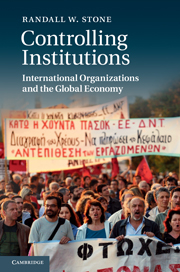Book contents
- Frontmatter
- Contents
- List of figures
- List of tables
- Preface
- List of abbreviations
- 1 Introduction: international organization and US power
- PART ONE THEORY
- PART TWO CASES
- 4 Informal governance in the IMF
- 5 The World Trade Organization
- 6 The European Union
- PART THREE HYPOTHESES
- Appendix: additional tables
- References
- Index
6 - The European Union
Published online by Cambridge University Press: 11 April 2011
- Frontmatter
- Contents
- List of figures
- List of tables
- Preface
- List of abbreviations
- 1 Introduction: international organization and US power
- PART ONE THEORY
- PART TWO CASES
- 4 Informal governance in the IMF
- 5 The World Trade Organization
- 6 The European Union
- PART THREE HYPOTHESES
- Appendix: additional tables
- References
- Index
Summary
The European Union (EU), like the IMF and the WTO, combines elements of formal and informal governance, but the wider distribution of power in Europe and the high and rapidly increasing returns to European cooperation have shaped a different balance between formal and informal governance. The United States casts a long shadow over the EU, having deliberately encouraged many of its early steps towards integration, and having inadvertently incentivized many of the more recent developments, but the leading economic power's absence from EU membership is even more significant than its external influence. The model of informal governance focuses attention on the distribution of structural power, which in Europe is relatively flat: there are several countries that can compete for the role of leading power, and the power differentials among European countries are smaller than between European countries and the United States. In the absence of a single, overwhelmingly dominant state, several leading states are able to play the game of informal influence in Europe, which implies either low levels of cooperation or high levels of legalization. The history of European integration has seen both patterns, and legalization has been the only available solution to the dilemmas of sovereignty. Indeed, the contemporary EU is the most striking example of legislative and judicial delegation to an international organization.
- Type
- Chapter
- Information
- Controlling InstitutionsInternational Organizations and the Global Economy, pp. 104 - 130Publisher: Cambridge University PressPrint publication year: 2011
- 2
- Cited by



